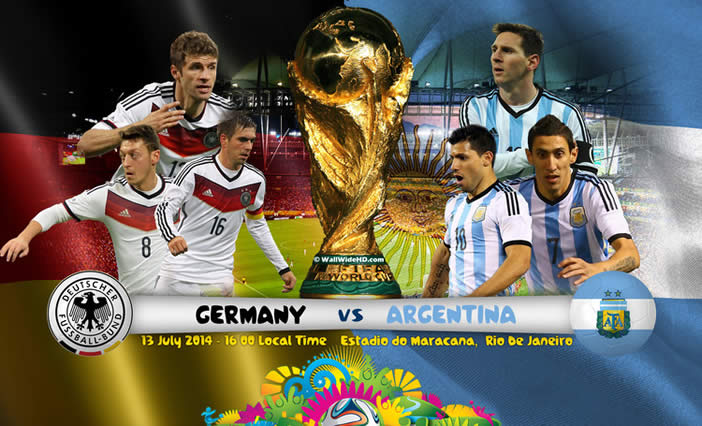
The Sunday Mail

 Two promising crops meet tonight in a World Cup final that celebrates collective brilliance rather than individual genius. And so here we are: two generations that genuinely deserve to be called golden will meet in a brilliantly intriguing final, while a World Cup billed in its early rounds as a triumph of individualism, a pop star-ish affair of the celebrity No. 10s, has been pared down at the last to something more structural.
Two promising crops meet tonight in a World Cup final that celebrates collective brilliance rather than individual genius. And so here we are: two generations that genuinely deserve to be called golden will meet in a brilliantly intriguing final, while a World Cup billed in its early rounds as a triumph of individualism, a pop star-ish affair of the celebrity No. 10s, has been pared down at the last to something more structural.
The match kicks off at 10pm.
Never mind the narrative, forget for now the random accident of individual genius: welcome to the jogo colectivo!
There are, of course, still considerable differences between these two final crops. Not to mention equally poignant levels of fear and anxiety.
Germany are probably favourites to win this World Cup, just as they should probably be favourites to win every tournament given the supremely well-resourced and productive youth system put in place by an eminently sensible football association. And yet the burden of such riches is tangible at times. For the united Germany, this is only a second World Cup final in six attempts, whereas between 1954 and 1990 the now subsumed entity known as West Germany reached six finals out of 10. German football had become fretful before this tournament, deflated by successive semi-finals, troubled by the sense that this bottle-fed generation of players is proficient but nice, brilliantly schooled but missing that vital quality of desperation, what Lothar Matthäus (who would probably know) has called “the really nasty players”.
Perhaps that stunning, unrepeatable semi-final victory over Brazil has also raised the vague prospect of another Maracanaço this evening — this one Euro-flavoured: a Maracan-alemaço perhaps — as like Brazil in 1950, Germany have come scooting through at the last on a surge of attacking success.
Back then, Brazil had also just won 7-1 and faced a final match against a stodgier looking Uruguay. And, while Bayern Munich’s Champions League win in 2013 confirms the calibre of these players, uncertainty from here will tend to centre now on Joachim Löew, who has the manner, the frown, the chat, the roll-necked jumpers of a footballing genius, just not the medals.
If there is a pressure on Germany to capitalise on its superabundance of talent, the pleasant discomfort of an embarrassment of riches, Argentina’s own anxieties are more about disappearance and dwindling away. Right now, the current team looks like a last breath of the superbly fecund youth systems put in place by José Pékerman during his time as coach of Argentina’s youth teams in the mid-1990s. In the Pékerman, era Argentina not only won four Under-20 world titles (the last that 2005 starburst), but clubs in the domestic top tier were inspired to re-arrange their own coaching systems to replicate and feed into the Pékerman vision of small perfectly balanced ball-players and a style based on rapid “vertical” attacking movement.
Pékerman, who coached Colombia here, has had no involvement with his homeland’s national teams since the World Cup quarter-final defeat by Germany in 2006. Since when, the argument goes, his systems have been increasingly neglected by a domestic league more focused on TV rights money. And, certainly, there appears to be a gaping talent vacuum beneath the class of 2005: just look at the current squad, in which 13 out of 23 players are within the class of 2005 age group, and only Marcos Rojo is under 25. This is not the Argentinian way. There is a blockage here, a sense of riches to be cashed in now before the thin times to come.
There is another strand to this generational clash of systems in Rio tonight. What are we left with here? In a certain light, this first South American World Cup final in 36 years already looks like a distinctly European affair. Of 46 players available to be selected, 43 play in Europe, while of Argentina’s possible starting XI only Rojo has been there less than seven years (he has been in Moscow and Lisbon for the past three). Even Messi was seen for many years in his own country as a quasi-European, a semi-Catalan, a creative player whose talents, and indeed personality on the pitch, had been refined by Barcelona into something not obviously recognisable as Argentinian: more academic and orderly, a “cold” European-style creative star. It could be argued, pejoratively of course, that a first European World Cup win on South American soil is a certainty whatever the score, either in name or by proxy.
Which brings the pre-final whirl back, once again, to systems. The death of tiki-taka has already been proclaimed at this tournament (including by this writer, albeit without suggesting anybody at this World Cup kept the ball well enough to claim tiki-taka even came here in the first place). Either way, it turns out possession football isn’t dead after all. In fact, it’s very much alive and present at the Maracanã. This is the thing about coherent, refined generations of modern footballers: they tend to keep the ball. Under Löew, Germany play a variant on the Barcelona style, albeit with more emphasis on the speed of passing. Löew has been known to put a stopwatch on the time his players take to release the ball, urging them to trim another tenth of a second off the team average, a style that is perhaps not so much tiki-taka as quicki-taka.
This Argentina team, meanwhile, is pegged out around Messi and Javier Mascherano, Barcelona royalty in the wonder years, and both protégées in their own way of the absent spectre at this feast of a World Cup final, the current king of European systems-based football, Pep Guardiola.
Oddly enough, without ever managing a national team, Guardiola has managed to become a hugely potent background figure, not just at this World Cup final, but at the last one too. Not only is Guardiola’s peak Barcelona style, as adapted at Bayern Munich (with a lineage going back through Heynckes-Van-Gaal-Cruyff) still a dominant influence, he is also the current coach of six of Germany’s starting XI, was coach of seven of Spain’s winning players four years ago, and is the coach who took Messi in off the wing and made him a goal scoring phenomenon.
Teams, systems, groups of players schooled in the same well-ordered habits: this has been the message of the late stages of Brazil 2014, and will be the lurking theme of tonight’s delicious-looking World Cup final whatever shape the match itself takes. — Guardian.






